Aramaic is a Northwest Semitic language that originated in the ancient region of Syria and quickly spread to Mesopotamia, the southern Levant, southeastern Anatolia, Eastern Arabia and the Sinai Peninsula, where it has been continually written and spoken in different varieties for over three thousand years.
Black metal is an extreme subgenre of heavy metal music. Common traits include fast tempos, a shrieking vocal style, heavily distorted guitars played with tremolo picking, raw (lo-fi) recording, unconventional song structures, and an emphasis on atmosphere. Artists often appear in corpse paint and adopt pseudonyms.

Hezekiah, or Ezekias, was the son of Ahaz and the 13th king of Judah according to the Hebrew Bible.
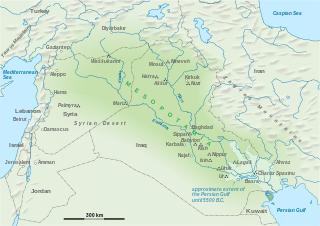
Mesopotamia is a historical region of West Asia situated within the Tigris–Euphrates river system, in the northern part of the Fertile Crescent. Today, Mesopotamia is known as present-day Iraq and north-eastern Syria. In the broader sense, the historical region of Mesopotamia also includes parts of present-day Iran, Turkey, and Kuwait.
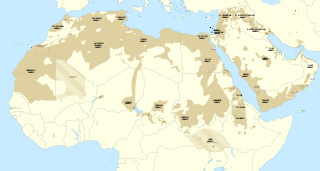
The Semitic languages are a branch of the Afroasiatic language family. They include Arabic, Amharic, Aramaic, Hebrew, and numerous other ancient and modern languages. They are spoken by more than 330 million people across much of West Asia, North Africa, the Horn of Africa, Malta, and in large immigrant and expatriate communities in North America, Europe, and Australasia. The terminology was first used in the 1780s by members of the Göttingen school of history, who derived the name from Shem, one of the three sons of Noah in the Book of Genesis.
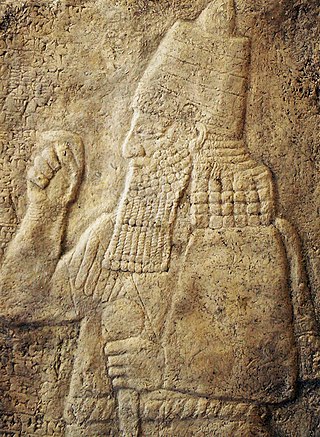
Sennacherib was the king of the Neo-Assyrian Empire from the death of his father Sargon II in 705 BC to his own death in 681 BC. The second king of the Sargonid dynasty, Sennacherib is one of the most famous Assyrian kings for the role he plays in the Hebrew Bible, which describes his campaign in the Levant. Other events of his reign include his destruction of the city of Babylon in 689 BC and his renovation and expansion of the last great Assyrian capital, Nineveh.

Uzziah, also known as Azariah, was the tenth king of the ancient Kingdom of Judah, and one of Amaziah's sons. Uzziah was 16 when he became king of Judah and reigned for 52 years. The first 24 years of his reign were as a co-regent with his father, Amaziah.
Suret, also known as Assyrian refers to the varieties of Northeastern Neo-Aramaic (NENA) spoken by Christians, namely Assyrians. The various NENA dialects descend from Old Aramaic, the lingua franca in the later phase of the Assyrian Empire, which slowly displaced the East Semitic Akkadian language beginning around the 10th century BC. They have been further heavily influenced by Classical Syriac, the Middle Aramaic dialect of Edessa, after its adoption as an official liturgical language of the Syriac churches, but Suret is not a direct descendant of Classical Syriac.

Absu was an American black/thrash metal band from Dallas, Texas. Their demos and first album leaned towards death metal, but later adapted to the thrash/black sound the group would become recognized for. Their lyrical themes are esoteric, including themes of Celtic, Sumerian and Mesopotamian myths and legends, alchemy, numerology, magick, and sorcery.

The Assyrian homeland, Assyria, refers to the homeland of the Assyrian people within which Assyrian civilisation developed, located in their indigenous Upper Mesopotamia. The territory that forms the Assyrian homeland is, similarly to the rest of Mesopotamia, currently divided between present-day Iraq, Turkey, Iran and Syria. In Iran, the Urmia Plain forms a thin margin of the ancestral Assyrian homeland in the north-west, and the only section of the Assyrian homeland beyond the Mesopotamian region. The majority of Assyrians in Iran currently reside in the capital city, Tehran.
This is a timeline documenting the events of heavy metal music in the year 1994.

Tara is the fourth album by blackened thrash metal band Absu. It was released on May 23, 2001, by Osmose Productions. A remastered edition was supposed to come out in September 2007, but was delayed until March 2009. It contains the In the Eyes of Ioldánach EP as bonus tracks. Early promotional material for the album stated that Mike Scaccia of Rigor Mortis/Ministry fame would contribute to the album but that did not occur. In addition, King Diamond did contribute vocals to the album but could not be credited due to contractual restrictions. He is credited as Masthema Mazziqim, a pseudonym used by the singer of Dolmen, a band that eventually became Absu.
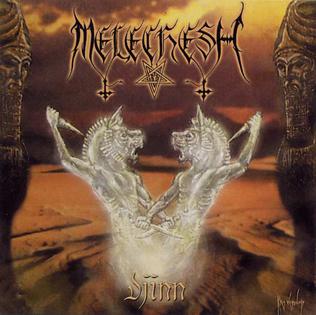
Djinn is the second full-length album by the black metal band Melechesh, and their first on Osmose Productions. A video for Genies, Sorcerers and Mesopotamian Nights was made, using an abridged version. Also note that the song "The Siege of Lachish" is actually 6 minutes and 21 seconds long; after an extended period of silence, a Mesopotamian chant played in reverse starts at 9:32.
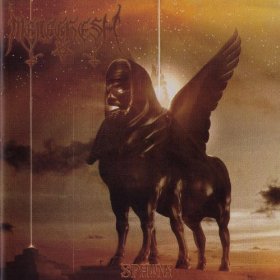
Sphynx is Melechesh's third full-length album. The album presents the band's Mesopotamian/Sumerian metal in a more aggressive and intricate manner. The CD version includes an enhanced multimedia section featuring a trip to the world of Melechesh. There is a guest appearance from Andy LaRocque on the track "Purifier of the Stars".

The siege of Lachish was the Neo-Assyrian Empire's siege and conquest of the town of Lachish in 701 BCE. The siege is documented in several sources including the Hebrew Bible, Assyrian documents and in the Lachish relief, a well-preserved series of reliefs which once decorated the Assyrian king Sennacherib's palace at Nineveh.

Desaster are a German black/thrash metal band formed in Koblenz in 1988. Their lyrical themes involve war, hate and Satanism.
Assyrian folk/pop music, also known as Assyrian folk-pop, is the musical style of the Assyrian people derived from traditional music that includes a broad range of stylistic varieties, which would also encompass fusions of Western genres such as pop, electronic, Latin, jazz and/or classical music, with a melodic basis of Assyrian folk.

Archgoat is a Finnish black metal band formed in 1989 by twin brothers Ritual Butcherer on guitar and Lord Angelslayer on bass and vocals. It was one of Finland's first black metal bands along with Barathrum, Impaled Nazarene and Beherit. The members of Archgoat openly identify with the philosophy of Satanism and the occult as expressed in their lyrical content, which also consists of anti-Christian themes.
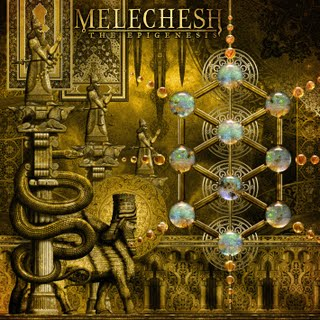
The Epigenesis is the fifth full-length album by the black metal band Melechesh.

Betraying the Martyrs were a French metalcore band formed in Paris in 2008. The band's final lineup consisted of vocalist Rui Martins, guitarists Steeves Hostin and Baptiste Vigier, bassist Valentin Hauser, drummer Boris le Gal, and keyboardist Victor Guillet. At the time of their breakup in 2023, they were signed to Out of Line Music. Through their previous label, Sumerian Records, Betraying the Martyrs released four studio albums: Breathe in Life (2011), Phantom (2014), The Resilient (2017), and Rapture (2019). They also released two EPs: The Hurt the Divine the Light (2009) and Silver Lining (2022).


















